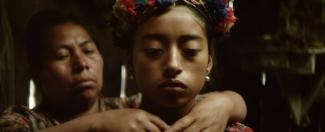Summer special
Girl’s destiny

Jayro Bustamante, the director, chose the region he grew up in as location for his first feature film. He also recruited the actors locally from the Kaqchikel Mayan community. They all are villagers who previously had no acting experience. He held workshops with the local people to discuss the problems they face. He listened to their life stories, empathising with their experiences and worries. On this basis, Bustamante wrote the screenplay. The plot is fiction, but it is rooted in social reality and assess it from within.
Bustamente’s main topic is the role of women as mothers and as victims in this particular society, as he has said in interviews. The story of Ixcanul, which means “volcano” in the Kaqchikel language, is rather sad. It is about the typical fate of millions of girls around the world. María is a beautiful 17-year old Mayan girl who lives and works with her parents on a coffee plantation at the foot of a volcano. She is supposed to marry Ignacio, the overseer. He is a good match who would not only secure María’s livelihood, but also raise her parents’ status.
María is not eager to marry him however. Ignacio is a widower with three children, much older than María and rather unappealing. There is also Pepe, a plantation worker and still more a boy than a man, she is getting involved with. He is not the love of her life, but he is young and rebellious and thus promises change. Pepe wants to migrate to the USA though and certainly doesn’t need a millstone around his neck on that journey.
The idea of joining Pepe and breaking with the traditional life both fascinates and scares María. In this sense, Ixcanul is a coming-of-age story that deals with the teenager’s inner struggles, torn between the world she knows and the big wide world behind the volcano. Awakening sexuality plays a role too. María loses her virginity with Pepe – mainly in order to tie him to herself. Her plan does not work out though. When María finally decides to go with Pepe, it is too late, because he has already left without telling her. María stays behind pregnant. She is in big trouble, and so are her parents.
Juana, the mother, tries to take care of the situation using traditional Mayan practices – with no success. Several abortion attempts fail, and Juana concludes that the baby is meant to live. However, a dramatic situation evolves in which tradition clashes with modernity. After a snake bite, white doctors in hospital save María’s life, but take her baby away. They make the family believe that the baby did not survive the medical intervention. Child trafficking used to be a major problem in Guatemala, and most victims were indigenous people.
In the end, María marries Ignacio. She does not manage to escape her destiny. She has lost both her child and her lover who promised change. The viewer is not left with much hope for María’s life. But is she really without power? She feels like the volcano. Outside there is stone, but inside there is fire. One day, she may erupt. Even if María sees no choice now and is playing her role, she may find a way to make a difference in her daughters’ lives.
Film
Ixcanul (volcano), 2015, Guatemala/France, directed by Jayro Bustamante














